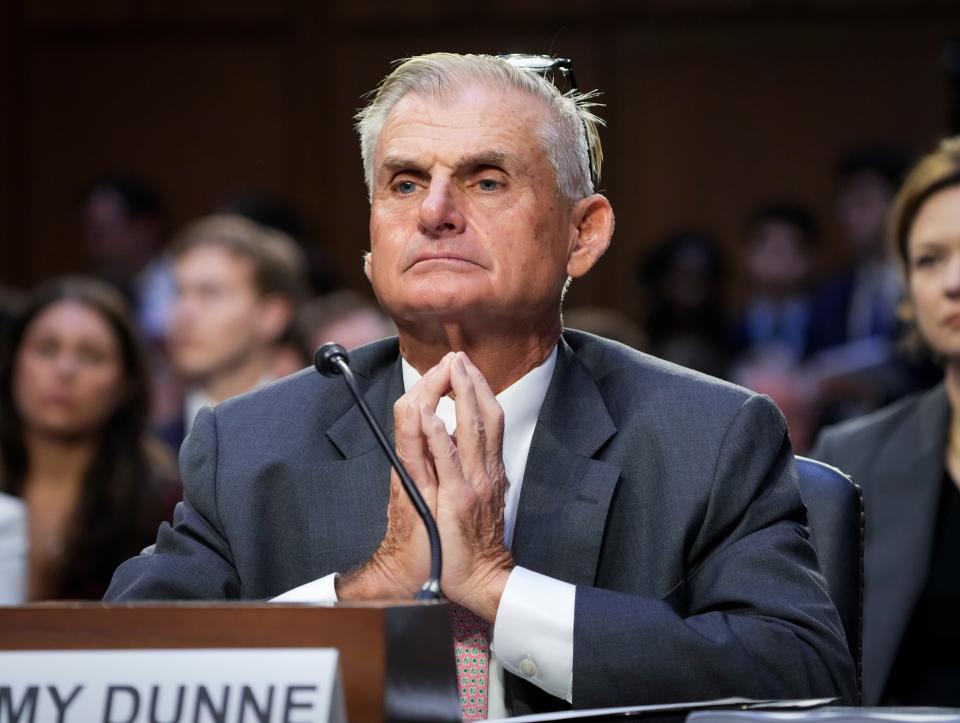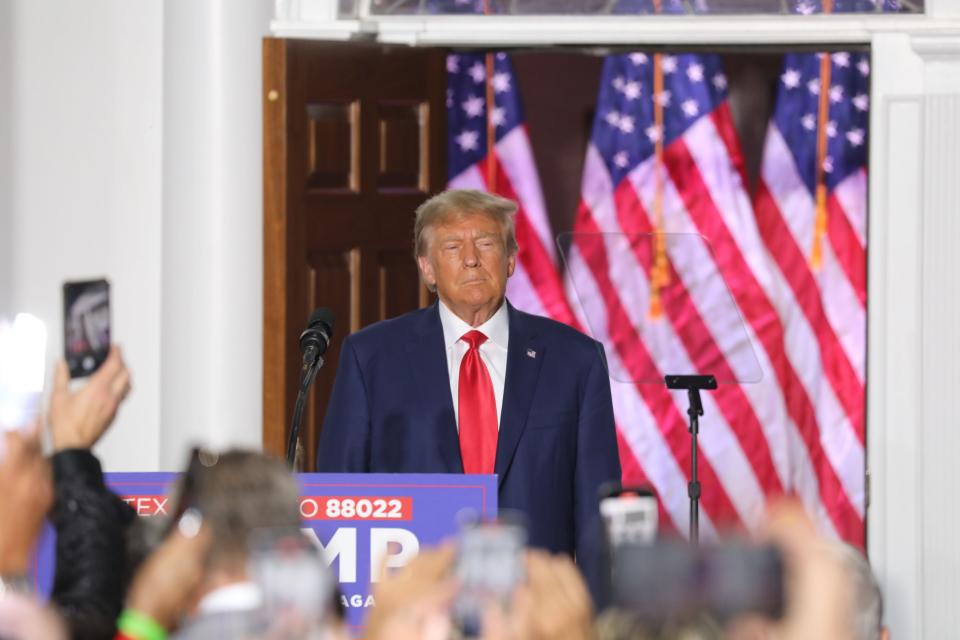Did 9/11 memories fade due to Saudi money? For one PGA official, they may have | Kelly
- Oops!Something went wrong.Please try again later.
Golf saved Jimmy Dunne from possible death in the 9/11 attacks. Now Dunne wants to save golf by taking money from the foreign nation that is accused of helping to carry out those attacks, the deadliest in American history.
Some people have a problem with this.
Not Jimmy Dunne.
Dunne, a former Wall Street executive, has emerged as one of the key players in the proposed merger of America’s premier professional golf tournament organizer — the PGA Tour — with the upstart LIV pro-golf tour which is bankrolled by Saudi Arabia’s government-controlled investment fund.
The irony here is that Saudi Arabian government officials — including several in its embassy in Washington, D.C. — have been linked by newly released FBI investigative reports to playing a supporting role in helping 19 Islamist radicals carry out the 9/11 terrorist attacks. The Saudi government is also the target of a massive federal lawsuit by 9/11 victims — the biggest lawsuit in U.S. history. So far, however, the Saudis have stonewalled every attempt to ask questions about 9/11. For the Saudis, accountability seems to be a character flaw.

As for Dunne, he was supposed to be working at the Sandler O’Neill investment firm on the 104th floor of the South Tower of the World Trade Center in lower Manhattan on that Tuesday in September 2001 when those attacks took place. Dunne was one of Sandler O’Neill’s founders.
Instead, Dunne was 50 miles away that morning, in Bedford, New York, playing golf. He says he was trying to qualify for an amateur tournament.
The tragedy of 9/11 can be told in several ways.
There is, on one hand, the broad narrative, chronicled by the bipartisan 9/11 Commission, which was chaired by former New Jersey Gov. Tom Kean. The commission’s report, released in 2004, tells the story of how America’s top spy agencies missed clear warning signs of the growing threat by Osama bin Laden’s al-Qaida terror organization. It’s a story of mismanaged bureaucracies and narrow-minded politics.
Then, there are the personal stories — of how this act of terror snuffed out the lives of nearly 3,000 people whose only mistake was to show up for work at the trade center, at the Pentagon in Northern Virginia or on a flight that crashed into a Pennsylvania farm field.
The victims ranged from ordinary office workers, high-flying stock traders and janitors to firefighters, cops and other first responders who bravely climbed the stairs of the trade center, only to die when the twin towers collapsed.
One of those victims was Welles Crowther of Nyack, New York — across the Hudson River and about 30 miles from the country club where Jimmy Dunne was smacking golf balls on the morning of 9/11. After the attacks, America came to know Crowther, 24, as “the man in the red bandanna” who helped dozens of office workers to safety but ended up dying when the South Tower collapsed.
Jimmy Dunne was Crowther’s boss at Sandler O’Neill. Of the 86 Sandler O’Neill staffers who showed up for work on Sept. 11, 2001, 66 perished — including Crowther.
Crowther’s mistake — if we can describe the work of a hero that way — was that he ran back into the South Tower too many times and never thought about saving himself. Years later, President Barack Obama cited Crowther’s bravery while speaking at a 9/11 commemoration ceremony.
Dunne promised soon after the attacks not to forget the workers he lost and those who survived. He guaranteed salaries and health benefits far longer than he needed to. He even helped to finance college tuitions for the children whose mothers or father died.
"I'm not a poet. I'm not going to write any poems,” Dunne told the Los Angeles Times as the nation grieved in the months after 9/11. “I'm not going to write a novel. I'm not going to sing any songs. I'm not a musician. I'm going to do what I can do. I am a Wall Street guy."
A merger fueled by money
In some ways, Dunne emerged from those attacks as a hero.
But fast-forward to another Tuesday — July 11, 2023. Just a few weeks ago. More than two decades had passed since the 9/11 attacks. Dunne was no longer just "a Wall Street guy," helping 9/11 victims. He had taken on another role.
Dunne, now a member of the PGA’s Tour Policy Board, sat at a desk in a Capitol Hill hearing room, facing Sen. Richard Blumenthal, the Connecticut Democrat who is leading an inquiry into the merger of America’s professional golfers with Saudi Arabia. It was Dunne's task to justify why the PGA Tour, which is separate from the PGA which consists mainly of teaching pros who do not compete for the big bucks at tournaments, was joining with the Saudis.
Ironically, this was the same hearing room where Kean’s 9/11 Commission conducted its key hearings two decades ago. Now, America was hearing another kind of tragedy, however.
As the day unfolded, we learned that this merger was fueled by money — “north of $1 billion,” as the PGA Tour’s chief operating officer, Ron Price, noted when pressed by the committee as Dunne sat next to him. We also learned that the PGA Tour feels it needs the Saudi money to survive.

Whether that’s true still remains to be seen. The PGA Tour traffics in million-dollar endorsements. Golf is not a poor man’s game. Even middle-of-the-road players can earn millions.
If we are to believe some media reports, numerous PGA Tour golfers are angry that their leaders decided to accept money from the Saudi Public Investment Fund, which is controlled by the Saudi government. Only last year, the PGA Tour not only criticized the Saudi-financed LIV Golf tournament — calling the ploy an attempt at “sport-washing” Saudi Arabia's poor human rights record — but also banned such star golfers as Phil Mickelson and Brooks Koepka from further PGA tournaments.
At the top of the list of reasons for this criticism were the FBI reports on the Saudi connection to the 9/11 attacks. Also important was the CIA’s conclusion that Saudi Crown Prince Mohammed Bin Salman ordered the murder of Washington Post columnist and Saudi critic Jamal Khashoggi.
Mickelson and Koepka didn’t seem to mind. They got paid handsomely. Mickelson reportedly received $200 million just to sign on with LIV. Koepka allegedly took in a heft amount. So did plenty of other players.
And so did former President Donald Trump.
It was Trump who invited LIV to use two of his golf courses last year for tournaments, including one in Bedminster, New Jersey. Trump was angry with the PGA after it withdrew its championship tournament from Trump's New Jersey course because of the former president's alleged role in the January 6, 2021 assault on the U.S. Capitol.
In two weeks, LIV will return to Trump’s Bedminster course again. Neither Trump nor the Saudis have disclosed what they paid the former president, but let’s just assume it was more than lunch at a fast-food joint.
Apparently this new friendship with the Saudis caused a change of perspective for Trump. In 2016, he voiced his own suspicions that the Saudis played a role in the 9/11 attacks. “Who blew up the World Trade Center?” he asked. “Take a look at Saudi Arabia.” Once in the White House, Trump even met with families of 9/11 victims who expressed concerns about the Saudi links to the attacks.
But after the Saudis dangled money in front of Trump’s nose last year, he turned his backs on those families, claiming — falsely — that “nobody’s gotten to the bottom of 9/11, unfortunately.” Trump made that comment at his Bedminster golf course as more than a dozen relatives of 9/11 victims staged a protest at a nearby park. One of those protesters was Welles Crowther's mother, Alison.
She waved a red bandanna similar to the one her son wore and said: “Sometimes I think our government is more interested in protecting everyone else and has forgotten us.”
'The best path forward.' Really?
For months, America believed that the PGA Tour would steer clear of LIV. But earlier this year, two PGA Tour officials secretly met with LIV. One of those officials was Jimmy Dunne.
Sitting in the Senate hearing room two weeks ago, Dunne offered up a four-page statement to Blumenthal’s committee in which he claimed he had joined hands with Saudi Arabia because he was concerned with preserving the “future of golf” and resolving the “huge and growing disruption” that was caused by the LIV tour and its big payouts to American golfers.
As for the 9/11 attacks, Dunne said “there is not a day when I fail to think about the friends I lost that day. I have tried to keep faith with them and their families in everything I do.”
At the same time, he conceded that he harbored “concerns” over the Saudi investment in America’s professional golf tour but said he was “very confident” that the merger “was the best path forward for the Tour, for the players, for the fans, for the game of golf, and indeed for our country.”
Dunne did not mention the allegations of Saudi links to 9/11. Nor did he mention another obvious question: If not for the Saudi promise of an investment of $1 billion or more in the PGA Tour, would this merger have fallen flat? In other words, was this change of heart all about money? Did the noble memories of 9/11 take a back seat to a dollar bill?
Sadly, money seems to have talked the loudest with America’s professional golfers and with a former president who still claims (falsely) that his attempt to remain in office was stolen.
Money may save professional golf.
But at what cost?
Mike Kelly is an award-winning columnist for NorthJersey.com, part of the USA TODAY Network, as well as the author of three critically acclaimed non-fiction books and a podcast and documentary film producer. To get unlimited access to his insightful thoughts on how we live life in the Northeast, please subscribe or activate your digital account today.
Email: kellym@northjersey.com
This article originally appeared on NorthJersey.com: Jimmy Dunne: Did PGA-LIV merger make 9/11 memories fade?

